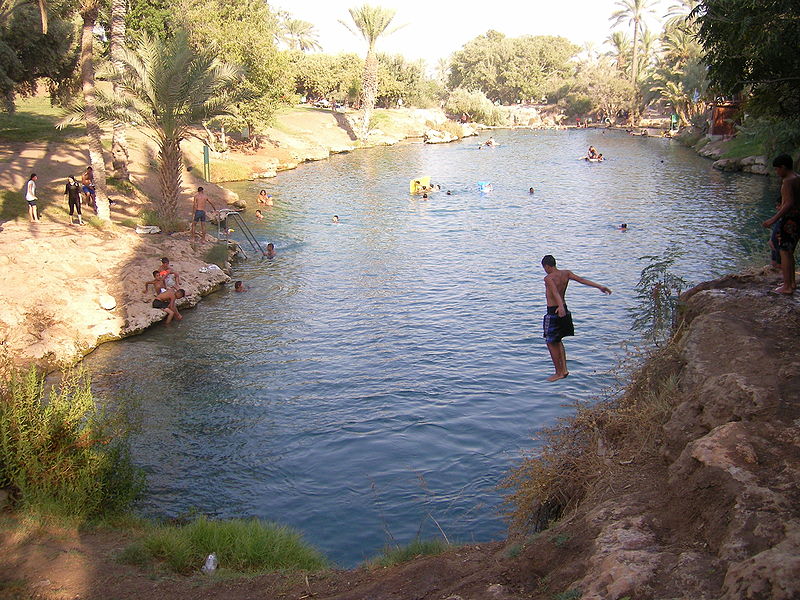
The 7th Annual Other Israel Film Festival, ending today at the JCC of Manhattan, presents films focused on the stories of the other 20% of Israel’s population such as Palestinians and other Arabs and Druze. The message of these films is powerful: There’s a whole other Israel out there than the one you see on Birthright. They have a culture and lives all their own and their stories need to be told. Here is my review of one of its movies, The Garden of Eden. More reviews from Catie Damon next week.
We open with water. Cool, sparkling water in the summer encompassed by rocks and waterfalls. It’s Israel’s Independence Day. A man is swimming in the water, carelessly moving his body about in the total freedom it offers. Then we hear his voice: he is a liar. He used to have a wife and a family, but he lied to them so he could come to the park and swim in this water. Now he can swim all he wants, but he is alone. He is alone in the water, and alone outside of it. As he gets out of the pool and steps into the shower, he says he deserves this. This loneliness is his punishment. Cut to THE GARDEN OF EDEN in big white letters against a black screen.
Faces. Bellies. Sunbathers. The pool. For Jews, it’s Gan HaShalosha National Park; for Arabs, it’s the Sachne. For all, it’s an escape, a much-needed respite from the outside world. The Palestinians who guard it at night speak of its ghosts. A Jewish woman tells us how she has constant visions of her late husband. Once, in a dream, he came to her and told her he wants a divorce. Frightened, she told her son who told her it means she needs to let go. A waterfall built into the pool is pouring down on her head as she stands still and stoic underneath it. Her detached voice tells the story from someplace else, an earlier time. Cut to a couple taking risqué wedding photos nearby.
More bellies. More legs. Some hairy and fat, some slender and smooth.
Ultra-Orthodox Jews get their own times at the park. Men swim in one area, women in another, separate one. We only see the men swimming. A middle-aged man with a big gray beard standing on a rock in the middle of the pool narrates the story. Eve’s eating the fruit brought lust into the world and ruined it for all her decedents, got them expelled from the Garden of Eden. As he explains, we cut to boys in Chasidic sidecurls as they taunt each other to jump off a high rock into the pool.
A Jewish man in a knitted yarmulke hears that Christians are coming to the park. He jokes they want to be near water because Jesus walked on it. The Christians turn out to be a group of Brazilian Evangelicals. Hands raised to Heaven, dressed alike in outfits combining the Brazilian flag with the Israeli, their leader testifies to the miracle of the State’s continued existence. He tells his kneeling followers to pray in Christ’s name for its government, its ministers, its people. At the top of the hill, a small cadre of sunburned Israelis in skimpy swimsuits looks on in confusion.
A Palestinian teen is alone in the pool, hanging onto a ledge. In voiceover, he talks about how much he hates Israel and everything associated with it. Everywhere he goes, he feels like an outsider. Many in his communities speak of incitement and violence and he doesn’t protest. He’s just so sick of all of it. He dunks his head underwater a few times. The only time he feels at home is when he’s outside the Land, in Europe or in Asia. He dreams of leaving. Says he never wants to see another Jew or another Arab again as he pushes off into the deeper parts of the water. He’s thinking maybe Canada.
Cut to the park’s Board of Directors. The park has a reputation as an Arab place, he wants to change that, bring it back to the pioneer spirit. Cut to Jewish kids dressed as Greeks pledging to do good and to live by love and be light. Cut to immigrants learning the early history of the pioneers, how they tamed the barren land and fought off marauding Arabs. We learn the stones in the waterfall were taken from demolished Arab homes in nearby Bet Shean. Now water runs over them constantly and onto people who need it.
People like the Holocaust survivor, the long-time abuse victim starting over, the Arab man who started a relationship with a Russian Jewish woman he knew was doomed from the start, the Yom Kippur War vet who lost his legs but now races hand bikes, and so many more. They come year-round to be in the water. To have it envelop them. To begin anew. And soon, it’s Independence Day again and far too many hands of all sizes and colors and ages are outside its too narrow gates, shoving and pushing and striving and squeezing past one another to get into the park, to be around the water. To be back in the Garden of Eden.
Derek M. Kwait graduated from the University of Pittsburgh and is currently editor in chief of New Voices.
